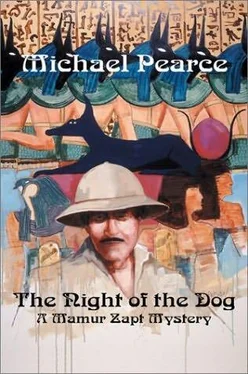Michael Pearce - The Mamur Zapt and the Night of the Dog
Здесь есть возможность читать онлайн «Michael Pearce - The Mamur Zapt and the Night of the Dog» — ознакомительный отрывок электронной книги совершенно бесплатно, а после прочтения отрывка купить полную версию. В некоторых случаях можно слушать аудио, скачать через торрент в формате fb2 и присутствует краткое содержание. Жанр: Исторический детектив, на английском языке. Описание произведения, (предисловие) а так же отзывы посетителей доступны на портале библиотеки ЛибКат.
- Название:The Mamur Zapt and the Night of the Dog
- Автор:
- Жанр:
- Год:неизвестен
- ISBN:нет данных
- Рейтинг книги:3 / 5. Голосов: 1
-
Избранное:Добавить в избранное
- Отзывы:
-
Ваша оценка:
- 60
- 1
- 2
- 3
- 4
- 5
The Mamur Zapt and the Night of the Dog: краткое содержание, описание и аннотация
Предлагаем к чтению аннотацию, описание, краткое содержание или предисловие (зависит от того, что написал сам автор книги «The Mamur Zapt and the Night of the Dog»). Если вы не нашли необходимую информацию о книге — напишите в комментариях, мы постараемся отыскать её.
The Mamur Zapt and the Night of the Dog — читать онлайн ознакомительный отрывок
Ниже представлен текст книги, разбитый по страницам. Система сохранения места последней прочитанной страницы, позволяет с удобством читать онлайн бесплатно книгу «The Mamur Zapt and the Night of the Dog», без необходимости каждый раз заново искать на чём Вы остановились. Поставьте закладку, и сможете в любой момент перейти на страницу, на которой закончили чтение.
Интервал:
Закладка:
The sheikh began a final exhortation. The last part of his serman, or speech was accompanied by continuous cries from his followers. His voice rose to a howl and drew the audience up with it into an excited, almost exalted, crescendo.
And then it stopped. The shouting went on, though, for several minutes. People leapt to their feet and milled around excitedly. This was the moment when, sometimes, a procession formed and they would march off to take action. If they did on this occasion Owen would be ready. His men drew their truncheons.
For a moment or two it seemed as if that was what would happen. A little group of men had got together and appeared to be trying to enlist others into a formation of some kind. There was so much untidy milling about, however, that in the confines of the tiny space they found it hard to organize themselves and eventually seemed to abandon the attempt.
The excitement died away and the crowd began to drift off down the side streets. The throng in front of Owen melted away, leaving his men exposed, so he drew them back into the shadows. In the square the torches began to go out, until there were only one or two left near the dais.
The Sheikh Osman sat on, relaxed now. A few of his followers had joined him on the dais.
Then he, too, rose to his feet. The square was quite empty by now and he and the little group of men with him made their way across it without difficulty. They disappeared down one of the side streets. Owen’s men moved unhurriedly after them.
They came up with Osman just where the street joined up with two others. The street was wider there and Owen’s men found it easy to slip round the sheikh, separating him from his followers and surrounding him.
The sheikh looked up, startled.
“What is this?”
Owen stepped forward.
“Come with me,” he said.
Then Osman understood.
He opened his mouth to shout. One of Owen’s Sudanis put a hand over his mouth, preventing him. There was a little struggle and Osman half-dragged himself free.
“There will be blood!” he shouted.
“It will be yours,” said Owen, and signalled to his men.
They closed round Osman and now he was silent. Muffled and tied, he was quickly shepherded away. For good measure Owen took several of his followers too. The others were left, startled and winded. One lay on the ground.
The passers-by at the end of the street had not even noticed.
Osman was taken to one of the cells beneath Owen’s office in the Bab el-Khalkh. The building was the Police Headquarters and well away from the Old City. It was also big and strong. Just in case.
Owen, though, did not expect any difficulty. It would take some time for the news to get around. Osman’s followers would have to get together; and Owen would see that they did not find that very easy. He had warned the Assistant Commissioner, McPhee, and together they would ensure that for the next two or three days the city was flooded with agents who would alert them at once to an assembly. By then perhaps Zoser would be caught. The crowd would have other things on its mind and Osman could be released.
It might even be possible to scare him into silence, although when he was brought to Owen’s office in the early hours of the morning that did not seem very likely.
“There will be blood,” he said again as he came through the door.
“There has been too much of that already,” said Owen. “That is why you are here.”
“There will be more,” Osman promised.
“It is bad there is blood,” said Owen, “either Moslem or Copt.”
“Where there is a blood debt,” said Osman, “there must be blood.”
“There was no debt originally,” said Owen. “There was just a foolish act.”
Osman did not reply.
“A sacrilegious act,” Owen pursued, “which you, as a holy man, ought to have done your best to prevent. Instead of encouraging it. And perhaps instigating it.”
“I did not instigate it,” said Osman haughtily.
“But you knew about it. He was one of your men.”
Osman shrugged.
“He was his own man,” he said, “in this.”
“But you knew. And could have stopped.”
“Why should I stop? It was only a Copt. Besides, have not the Copts-”
“Be quiet!” said Owen. “Such talk will not help you now. You allowed this thing to happen and so must bear some of the guilt.”
“There is no guilt.”
“You treated heavy things lightly,” said Owen, “and that does not accord with the Book.”
“You quote the Book at me?” Osman glared at him.
“I do. Where the Book itself is taken lightly the offender is not worthy of respect.”
Osman was plainly taken aback. He had not expected things to go like this. Owen pursued his advantage.
“You have done wrong,” he said, “and you must put things right.”
“I?” said Osman. “I?”
“You.”
“I have struck no blow.”
“You have caused many to be struck. It must be stopped before someone is killed.”
“Someone has been killed,” said Osman. “A Moslem. By a Copt.”
“That is for me,” said Owen. “Not for you.”
“There is a debt.”
“Which I will see is paid.”
“The Christians protect the Christians.”
“And the Moslems too.”
Osman looked at him.
“See that it is so,” he said.
Owen did not reply. After a moment Osman said: “Why have you taken me?”
“While I am pursuing the offender I do not want blood on the streets.”
“If you take me, there will be blood on the streets.”
“It will be Moslem blood,” said Owen, “and I would not have it so.”
“What do you want?” asked Osman.
“I want you to hold your hand,” said Owen, “for a time.”
“Why should I do that?”
“I suggest you go to some holy place, preferably out of the city, and pray for forgiveness for the levity which started this business.”
“What if I don’t?”
“You will stay here. And if there is blood you will have to pray for forgiveness for that also.”
Owen sent him back down to the cells to think about it. He did not expect Osman openly to agree but he thought it quite likely that the sheikh might indicate his willingness to accept Owen’s proposition. He thought he saw in Osman, beneath the intransigence and fanaticism, a certain uneasiness as to his own role in the affair. “Lightness” was not an easy charge for a religious sheikh to bear, especially if he felt there was some justification for the charge; and in his heart of hearts, away from the public arena, Osman might well accept the need for some self-examination. Owen hoped so. He would probably try releasing Osman even if he gave no outward sign of acquiescence. That might, in fact, make it easier for him. And, of course, if he did stir up trouble he could always be put inside again. However, Owen did not want to do that if it could be avoided. It would be better if the sheikh went away quietly by himself.
The attacks on the Copts brought, as Owen had expected they would, bitter representations from the Coptic community. Among the leaders who came to complain was Andrus.
“If you do not take action,” he said, “we shall.”
“You have said that to me before.”
“And you took no action.”
“I took action. But so did you.”
Andrus looked shaken.
“What do you mean?”
“Did you not take action?” Owen pressed him.
“If we did,” said Andrus, “who can blame us?”
“I blame you,” said Owen. “Without your action there would not have been blood, Coptic blood, on the streets.”
“I do not know what is this action you refer to.”
“Don’t you?” said Owen, looking him straight in the eye.
Читать дальшеИнтервал:
Закладка:
Похожие книги на «The Mamur Zapt and the Night of the Dog»
Представляем Вашему вниманию похожие книги на «The Mamur Zapt and the Night of the Dog» списком для выбора. Мы отобрали схожую по названию и смыслу литературу в надежде предоставить читателям больше вариантов отыскать новые, интересные, ещё непрочитанные произведения.
Обсуждение, отзывы о книге «The Mamur Zapt and the Night of the Dog» и просто собственные мнения читателей. Оставьте ваши комментарии, напишите, что Вы думаете о произведении, его смысле или главных героях. Укажите что конкретно понравилось, а что нет, и почему Вы так считаете.












